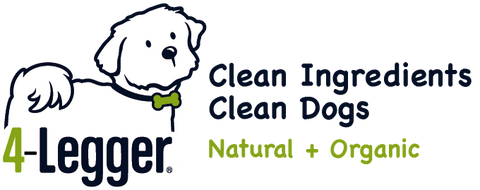Medicated Dog Shampoo for Yeast Infections: What Pet Parents Should Know
The "Yeasty Dog" Struggle
If your dog smells like corn chips, licks their paws constantly, or has greasy, darkened patches of skin, chances are you're dealing with yeast.
Yeast (Malassezia pachydermatis) is one of the most common skin issues in dogs, and it can make both you and your pup miserable.
When searching for relief, many pet parents reach for a medicated antifungal shampoo. Clever marketing has made these products look like miracle workers without taking into consideration the whole dog.
What Yeast Infections Look Like
Yeast infections can appear in many ways, but the most common signs include:
-
That telltale "Frito feet" smell.
-
Red, itchy skin (often in ears, armpits, groin, and between toes).
-
Greasy or waxy buildup on the coat.
-
Thickened, darkened, or elephant-like skin in chronic cases.
-
Excessive licking and chewing, especially of paws.
- Black dots on the belly.
Why Dogs Get Yeast Infections (It's Not Just Skin Deep)
Yeast naturally lives on your dog's skin and in their gut. It only becomes a problem when it overgrows - and that happens when the whole body’s immune system is out of balance.
Here are the biggest root causes:
-
Too Many Carbs in the Diet
Many commercial dog foods are loaded with starches like rice, corn, potatoes, and peas. Once digested, carbs turn into sugar and sugar is yeast's favorite food. The more carbs in the diet, the more fuel yeast has to grow.
👉 Learn how to calculate carbs in your dog's food. -
Gut Imbalance (Leaky Gut)
A healthy gut keeps yeast under control. But poor diet, stress, antibiotics, and toxins can damage the gut lining, leading to "leaky gut." This allows allergens, yeast, and toxins to leak into the bloodstream, triggering inflammation that shows up on the skin. -
Weakened Immune System
When the immune system is compromised, it can't regulate yeast efficiently. Over-vaccination, chronic medications, or poor nutrition all reduce immune resilience; making it easier for yeast to take over. -
Allergies and Environmental Triggers
Seasonal allergies (pollen, grass, dust mites) or food sensitivities disrupt and inflame the skin barrier. Once inflamed, yeast seizes the opportunity to multiply.
🔑 Bottom line: yeast infections are a symptom of full body imbalance - not just a skin problem.
How Medicated Shampoos Work on Yeast
Medicated antifungal shampoos typically use:
-
Miconazole (2%) → antifungal.
-
Ketoconazole (1-2%) → antifungal.
-
Chlorhexidine (2-4%) → antibacterial + antifungal support.
These can reduce yeast on the skin's surface, but they come with drawbacks:
-
Only a temporary fix → they don't address diet, gut, or immune health, so yeast often rebounds.
-
Drying and irritating → antifungals and chlorhexidine can strip natural coat oils and inflame sensitive skin.
-
Toxicity concerns → synthetic antifungals can be absorbed through the skin and stress the liver adding to the burden on the immune system.
-
Harsh additives → many formulas also contain sulfates, preservatives, dyes, and synthetic fragrances that further weaken the skin barrier.
Medicated shampoos kill yeast on the surface but don't stop the cycle.
Holistic Support for Yeast: Inside and Out
For lasting relief, you need a whole-dog approach:
-
Feed a low-carb diet → starves yeast of its fuel (sugar).
-
Support gut health → probiotics and anti-inflammatory foods help repair leaky gut.
-
Boost immune function → balanced nutrition and reduced toxin load support resilience.
-
Use natural topical care → gentle, true organic shampoos soothe the skin and discourage yeast without toxins.
A Natural Alternative: COOLING Tea Tree and Peppermint
Our COOLING Tea Tree & Peppermint Dog Shampoo is specifically designed to support yeast prone dogs without harsh chemicals:
-
Tea Tree Oil → natural antifungal & antibacterial action.
-
Peppermint Oil → cools irritation and calms itch.
-
Aloe Vera & Coconut Oil → hydrates and protects the skin barrier.
-
USDA Certified Organic → no sulfates, parabens, synthetic fragrances, or dyes.
Safe for routine use, COOLING helps break the cycle by restoring balance instead of stripping it away.
Quick Reference: Medicated vs. Holistic for Yeast
| Approach | What It Does | Concerns |
|---|---|---|
| Medicated Antifungal Shampoos (miconazole, ketoconazole, chlorhexidine) | Kill yeast on the skin | Temporary relief only; drying, toxic ingredients; yeast often rebounds |
| Holistic Care (low-carb diet, gut health, natural shampoo) | Supports skin balance without toxic ingredients and address the root cause | Safe, sustainable, long-term relief |
Final Thoughts: Beat Yeast at the Root
Medicated shampoos may reduce yeast for a short time, but they don't stop it from coming back and they often make sensitive skin even worse while compounding issues with the immune system.
For lasting relief, focus on the root causes: diet, gut health, immune strength, and natural topical care. That's how you give your dog real comfort - without exposing them to harsh chemicals.
That's exactly what our COOLING Tea Tree & Peppermint Dog Shampoo delivers: soothing, natural relief for yeast-prone dogs.





